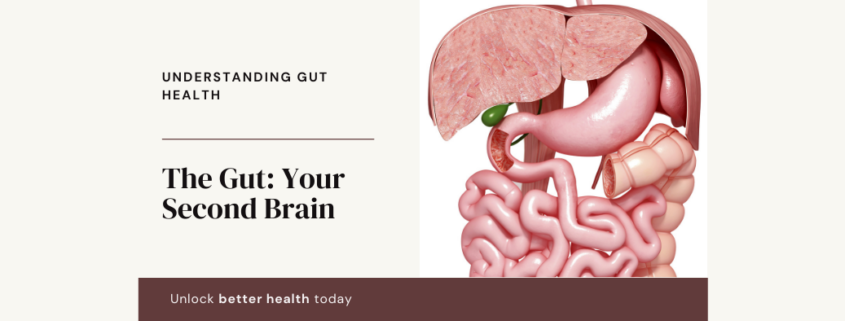The Gut: Your Second Brain
Health & Wellness Specific, Health and Wellness News, Weight Management(Podcast coming soon)
The gut, also known as the gastrointestinal (GI) tract, is responsible for digesting food, absorbing nutrients, and eliminating waste. However, its role extends far beyond digestion alone. The gut is home to trillions of microorganisms (collectively referred to as the gut microbiome), which play a key role in maintaining health. Emerging research suggests that the gut acts as a “second brain,” with the gut-brain axis enabling constant communication between the digestive system and the brain. A balanced gut microbiome not only supports digestion but also contributes to mental health, immune function, and even weight management.
The Digestive Process: What Happens in Your Gut
Digestion starts in the mouth, where enzymes in saliva begin breaking down food. Once swallowed, food travels to the stomach, where stomach acid and enzymes further the breakdown process. From there, the food moves to the small intestine, where the absorption of nutrients takes place. The large intestine (colon) then absorbs water and minerals and processes waste.
This complex system relies heavily on healthy gut bacteria, digestive enzymes, and proper muscle function to move food through the digestive tract and maximize nutrient absorption. Any imbalance in these functions can lead to digestive discomfort, nutrient deficiencies, and even broader health issues.
Why Gut Health Matters
A healthy gut plays a critical role in various bodily functions, including:
Nutrient absorption: A well-functioning gut allows your body to absorb vitamins, minerals, and macronutrients efficiently.
Immune support: Nearly 70% of the immune system resides in the gut. Maintaining a balanced gut microbiome helps regulate immune responses and defend against pathogens.
Mental health: The gut produces about 90% of the body’s serotonin, a neurotransmitter that affects mood, emotions, and sleep. An imbalanced gut microbiome can contribute to mood disorders like anxiety and depression source.
Weight management: Studies have shown that the diversity of the gut microbiome can influence body weight. An imbalance of gut bacteria may contribute to obesity and metabolic disorders source.
With so much depending on your gut, it’s essential to maintain its health. Luckily, several natural strategies can help enhance your digestion and keep your microbiome thriving.
Natural Ways to Improve Digestion
1. Incorporate Probiotic-Rich Foods
Probiotics are beneficial bacteria that can enhance your gut health by promoting a diverse microbiome. Consuming foods rich in probiotics helps balance the levels of good and bad bacteria in your digestive system, which can improve digestion, prevent bloating, and support immune function.
Yogurt: Contains live bacteria cultures like Lactobacillus and Bifidobacterium, which are known to support digestion source.
Kefir: A fermented drink that offers a wide variety of probiotics, which can promote gut flora diversity.
Sauerkraut and Kimchi: Fermented vegetables that are rich in probiotics and prebiotics, which feed the beneficial bacteria in the gut.
2. Consume Prebiotic-Rich Foods
Prebiotics are non-digestible fibers that act as food for the good bacteria in your gut, helping them thrive. Including prebiotic-rich foods can help maintain a healthy balance of bacteria, promoting efficient digestion.
Some prebiotic-rich foods include:
Garlic
Onions
Asparagus
Bananas
Oats
Apples
Research suggests that prebiotics can support gut health by increasing the population of beneficial bacteria like Bifidobacteria source.
3. Stay Hydrated
Water plays a fundamental role in digestion. It helps break down food so that your body can absorb nutrients and supports smooth movement through the intestines. Dehydration can slow digestion, leading to constipation and discomfort.
Aim to drink at least 8 glasses of water daily, but adjust based on your activity level and climate. You can also incorporate water-rich foods like cucumbers, watermelon, and oranges to stay hydrated.
4. Chew Your Food Thoroughly
Chewing is the first step in digestion. When you chew slowly and thoroughly, you give your body a head start in breaking down food, which reduces the workload on your stomach and intestines. Properly chewed food allows digestive enzymes to act more effectively, which can prevent issues like bloating and indigestion.
One study found that eating slowly and mindfully could lead to better digestion and nutrient absorption source.
5. Manage Stress
The gut-brain axis means that stress can have a direct impact on your digestive health. Chronic stress may lead to digestive problems like bloating, constipation, diarrhea, and irritable bowel syndrome (IBS). Stress triggers the release of hormones that can interfere with gut motility and the balance of gut bacteria.
To reduce stress and improve gut health, consider integrating relaxation techniques into your daily routine:
Mindfulness Meditation: Studies suggest that mindfulness can help reduce symptoms of IBS and improve gut health source.
Exercise: Physical activity helps to regulate digestion by promoting regular bowel movements and reducing stress. Aim for at least 30 minutes of moderate exercise most days of the week.
6. Avoid Overeating
Eating too much food at once can overwhelm your digestive system, leading to issues like indigestion and bloating. By practicing portion control and mindful eating, you can give your gut the time and space it needs to process food efficiently.
Practical Tips for Better Digestive Health
Here are some simple, actionable tips to help you improve your digestion naturally:
Start your day with a glass of warm water with lemon to stimulate digestion.
Add fermented foods like kimchi, kefir, or miso to your meals to boost probiotic intake.
Incorporate high-fiber foods like fruits, vegetables, and whole grains into your diet to promote regular bowel movements.
Take breaks during the day to practice deep breathing or meditation to lower stress levels.
Eat meals at consistent times each day to regulate your body’s digestive rhythms.
Conclusion: Take Charge of Your Gut Health
Improving your gut health is a long-term investment in your overall well-being. By incorporating probiotic-rich foods, staying hydrated, managing stress, and making mindful dietary choices, you can positively impact your digestion and support a healthy gut microbiome. Remember, every small change can lead to significant benefits over time.
By understanding the importance of gut health and implementing natural, science-backed strategies, you can empower yourself to take control of your digestion and overall health.
References links below:
Gut microbiota: The link to your second brain
Impact of gut microbiome on obesity
Probiotics and digestion
Prebiotics for gut health
Mindfulness and gut health




Leave a Reply
Want to join the discussion?Feel free to contribute!